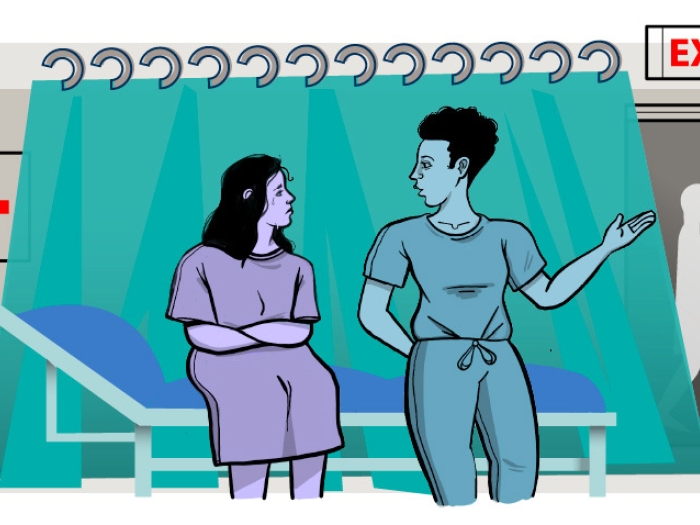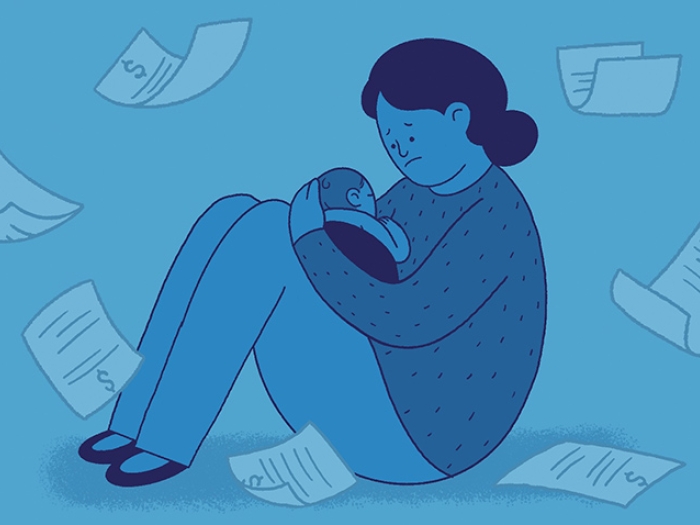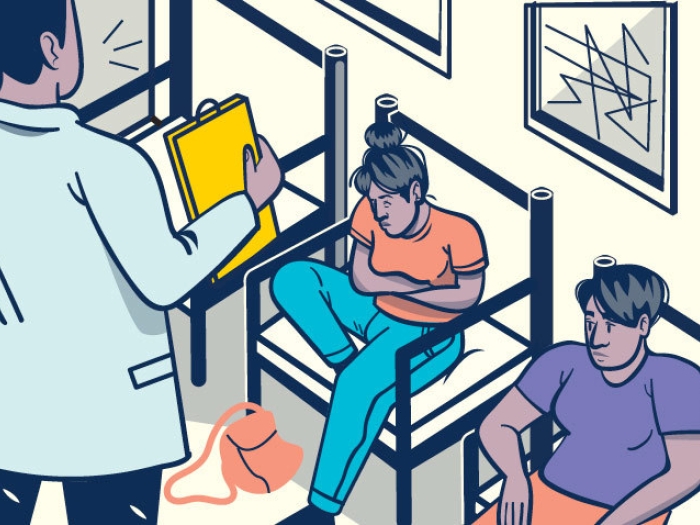Researchers explore how maternal sleep habits during pregnancy may be associated with fetal health.
7:00 AM
Author |

Sleeping more than nine hours per night during pregnancy may be associated with late stillbirth, a new study suggests.
An international team of researchers led by Michigan Medicine analyzed online surveys of 153 women who had experienced a late stillbirth (on or after 28 weeks of pregnancy) within the previous month and 480 women with an ongoing third-trimester pregnancy or who had recently delivered a live born baby during the same period.
LISTEN UP: Add the new Michigan Medicine News Break to your Alexa-enabled device, or subscribe to our daily audio updates on iTunes, Google Play and Stitcher.
The findings, which appear in the journal Birth, suggest an association between lengthy periods of undisturbed maternal sleep and stillbirths that were independent of other risk factors.
SEE ALSO: Increasing Rates of Chronic Conditions Putting More Moms, Babies at Risk
But researchers caution that further research is needed to better understand the relationship and what it means for pregnant women.
"Pregnant women often report waking up and getting up in the middle of the night," says lead author Louise O'Brien, Ph.D., M.S., a researcher in the Division of Sleep Medicine, Department of Neurology, and the Department of Obstetrics and Gynecology at Michigan Medicine.
"While multiple awakenings during the night may concern some women, in the context of stillbirth it appears to be protective."
Sleep patterns and maternal health
O'Brien says further studies need to delve deeper into what may drive the relationship between maternal sleep and stillbirths, with particular focus on how the autonomic nervous system — the control system that regulates bodily function — and the hormonal system are regulated during sleep in late pregnancy.
She notes that blood pressure reaches its lowest point during sleep but when someone is awakened, there is a surge in nervous system activity that causes transient increases in blood pressure.
It's possible, then, that these brief increases in blood pressure are able to prevent long periods of relatively low pressure. This is important, O'Brien says, because low blood pressure has been linked with fetal growth problems, preterm birth and stillbirth.
O'Brien also cautions that pregnant women should not be intentionally "waking themselves up at night." Very disruptive sleep has also been associated with poor pregnancy outcomes, including growth restriction and preterm birth.
MORE FROM MICHIGAN: Sign up for our weekly newsletter
She notes that while there is existing evidence that associates very disrupted sleep and clinical sleep disorders with poor pregnancy outcomes, few studies have looked at the opposite end of the spectrum, such as long periods of undisturbed sleep.
"Our findings add to research indicating that maternal sleep plays a role in fetal well-being," O'Brien says. "Studies aiming to reduce stillbirths should consider maternal sleep, as this is a potentially modifiable risk factor.
"Understanding the role of maternal sleep may help us identify interventions that would put us in a better position to advise women."
New approach to global problem
Stillbirth affects about 1 in 160 pregnancies in the United States, with about 24,000 babies stillborn in the country every year – 10 times as many deaths that occur from sudden infant death syndrome (SIDS), according to the Centers for Disease Control and Prevention.
About half of all stillbirths happen after 28 weeks of pregnancy; many remain unexplained.
Rates are even worse in low-income countries, but the U.S. stillbirth rate is higher than that of many other Western countries.
SEE ALSO: Why Mothers Need Personal and Clinical Support After a Baby's Death
Smoking, advanced maternal age, diabetes, obesity and drug abuse are among well-established risk factors for stillbirths. Maternal sleep practices, however, cover a relatively new area of investigation.
The new study follows other research looking at possible ties between maternal sleep and fetal well-being in recent years, including studies that suggest women who report sleeping on their backs have an increased risk of stillbirths. While the current study asked about maternal sleep position, not enough women reported sleeping on their backs for any meaningful analysis.
"Maternal sleep has been overlooked as a potential area for maternal and newborn health interventions even though it is related to many of the major, well-established risk factors for poor pregnancy outcomes. Until recently, it hasn't been on the radar for stillbirth research," O'Brien says.
"Many risk factors for stillbirths are not able to be modified once pregnancy has begun. But we should be looking at every possible intervention that may prevent poor outcomes. Progress in reducing stillbirth deaths has been slow, but stillbirth is an urgent global health issue that should be at the center of more research programs."

Explore a variety of health care news & stories by visiting the Health Lab home page for more articles.

Department of Communication at Michigan Medicine
Want top health & research news weekly? Sign up for Health Lab’s newsletters today!





